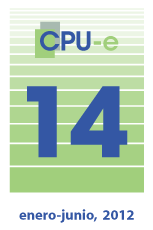Resumen
En las historias de las Ciencias Sociales existe una ausencia notoria del registro de experiencias formativas de los nuevos profesionales, en cada una de ellas. Por otro lado, en los estudios de egresados se atiende a su perfil socioeducativo en términos cuantitativos (cuántos egresaron, número de titulados, etc.) quedando pendiente un acercamiento más cualitativo. En el presente escrito nos interesa acercar al lector a la experiencia que han vivido los egresados universitarios a través de reconocer sus respectivas trayectorias escolares y personales dentro de una institución de enseñanza superior. El ejemplo específico que mostramos corresponde a la descripción de parte de la trayectoria de ocho egresados/as de las carreras de Antropología Social y Etnología que ofrece la Escuela Nacional de Antropología e Historia (ENAH). Además de atender a los dos pendientes señalados más arriba, otro rubro que nos interesa destacar es el propio perfil del estudio: investigar lo que viene aconteciendo en las instituciones formadoras de antropólogos/as desde una perspectiva antropológica. Investigaciones de este tipo nos permitirán identificar los problemas y sus posibles respuestas con el objeto de mejorar la formación académica y profesional de los futuros antropólogos y antropólogas en México.
Abstract
In the historyabout Social Sciences there is a big lack of formative experiences ofthe new professionals in each one of them. On the other side, studies about graduates pay attention to social educative profiles in quantitative specifications (how many students graduated, how many of them got a degree, etc.) leaving out a qualitative approach. In the present text we are interested to lead the reader closer to the experience that the university graduates have lived through the acknowledgment of their academic and personal trajectories in the college. The specific example we show, parts of the description of eight trajectories of students in Social Anthropology and Ethnology careers; that the ‘EscuelaNacional de Antropología e Historia’ (ENAH) brings. We include both topics mentioned before. We took the profiles to know what is happening nowadays at the universities that educates anthropologist from the view of Anthropology. This kind of investigation will allow us to identify problems and possible solutions for improving the academic and professional education in the new students of anthropology.
Recibido: 25 de noviembre de 2010
Aceptado: 2 de mayo de 2011
Los autores son los legítimos titulares de los derechos de propiedad intelectual de sus respectivos artículos, y en tal calidad, al enviar sus textos expresan su deseo de colaborar con CPU-e, Revista de Investigación Educativa, editada por el Instituto de Investigaciones en Educación de la Universidad Veracruzana.
Por lo anterior, de manera libre, voluntaria y a título gratuito, una vez aceptado el artículo para su publicación, ceden sus derechos a la Universidad Veracruzana para que el Instituto de Investigaciones en Educación reproduzca, edite, publique, distribuya y ponga a disposición dicha obra a través de intranets, internet o dispositivos de almacenaje, sin limitación alguna de forma o tiempo, siempre y cuando sea sin fines de lucro y con la obligación expresa de respetar y mencionar el crédito que corresponde a los autores en cualquier utilización que se haga del mismo.
Queda entendido que esta autorización no es una cesión o transmisión de alguno de sus derechos patrimoniales en favor de la mencionada institución, ni tampoco una licencia exclusiva, pues sólo tendrá una vigencia de seis meses a partir de la fecha de publicación.

CPU-e, Revista de investigación Educativa,
así como todos sus contenidos están bajo una
Licencia Creative Commons
Atribución-NoComercial 4.0 Internacional.

